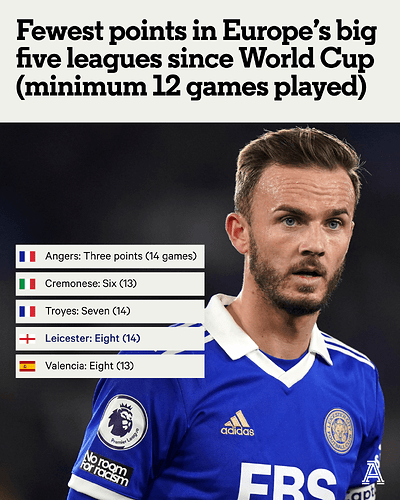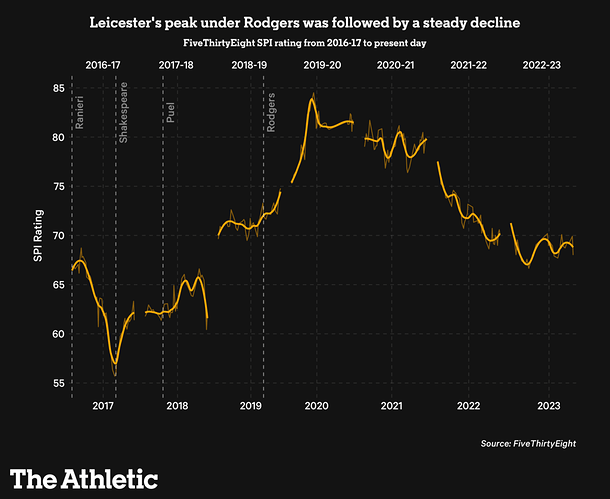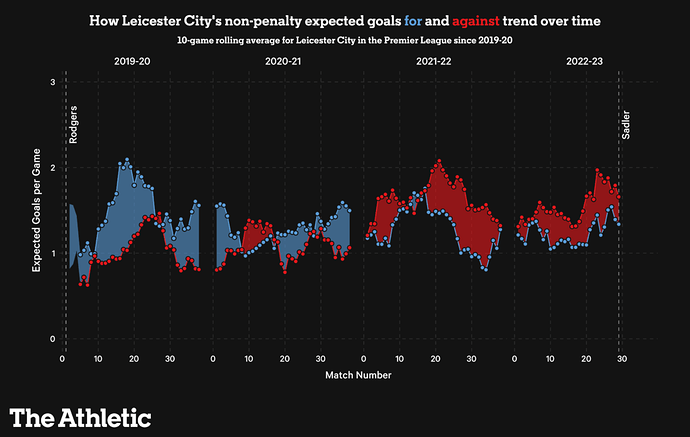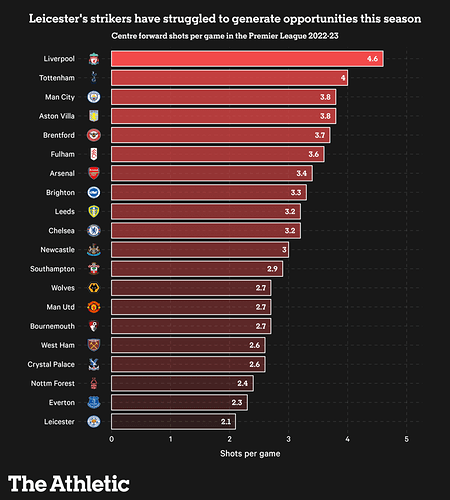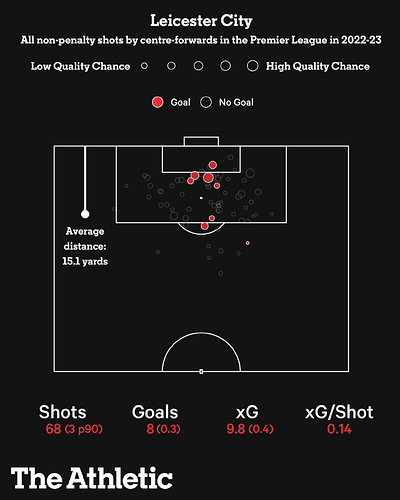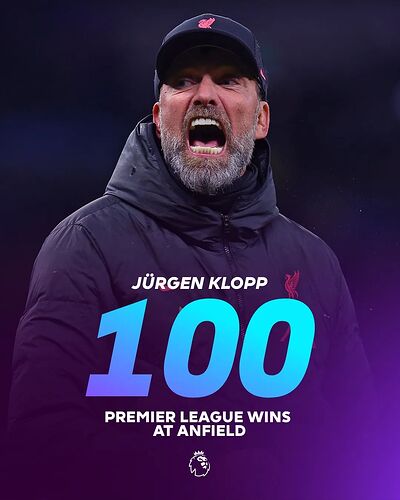Boję się, że przyszłe lato może zależeć od człowieka który ściągnął Kariusa a zamiast Salaha chciał Brandta. Zamiast pomocnika wolał Gakpo, który nie wie na jakiej pozycji będzie tu grał. Czy od Kloppa będzie zależeć budowa środka pola, mimo że nigdy nie rozumiał że najlepsze zespoły w historii miały najlepszych pomocników? Kiedyś po prostu doskok i odebranie piłki, laga na napastnika. W erze Jurgena to gegenpressing i ofensywni boczni obrońcy, dośrodkowanie. Może to jednak prymitywna gra tylko z dużo większą intensywnością? Asystent Jurgena wydaje książkę, dwóch Guardioli będzie konkurować w najlepszej lidze świata. Jakim trenerem jest Klopp? Wciąż wierzy w trening czy bardziej już konkurencja to wydawane funty? Dlaczego nigdy nie objął potentata jak Bayern, Real może PSG. Niech trwa mit, gdybym miał to co inni…ale w rzeczywistości nie chce, obawia się. To co tutaj jest sufitem, tam zaczyna się podłoże.
To akurat żadna tajemnica że Klopp potrafi trenować ale nie potrafi kupować.
Polecam artykuł. Jakieś to wszystko takie nie wiem… podobne. ![]()
Byłaby szansa na skopiowanie artykułu, albo przynajmniej- na wyciągnięcie jakichś najważniejszy elementów?
As Kasper Schmeichel and Wes Morgan raised the FA Cup to the heavens, accidentally sending its lid soaring over the heads of their celebrating team-mates behind them, life at Leicester City seemed perfect.
With the prospect of a Champions League spot for the second consecutive campaign also on the cards if they could see out their remaining two league games, there was so much hope around the club.
Just under two years on, however, and Leicester fans are struggling to feel much hope at all.
Their club are second bottom of the Premier League with nine matches to go and newly managerless, having taken only eight points from their 14 games since the season resumed after the World Cup — the joint fourth-lowest tally for that period of any club across the top five leagues in Europe.
FA Cup-winning manager Brendan Rodgers has gone and leaves behind a squad that this summer is set to see seven players depart as free agents and eight more enter the final year of their contracts, while the club’s best talents are likely to be sold to finance a huge rebuild.
Relegation next month, ending a run of nine seasons in the Premier League, is a very real prospect. There is nowhere to hide.
So, how has it come to this less than two years on from one of the club’s greatest days?
Well, what happened was…
The COVID-19 pandemic has played a huge role in Leicester’s decline and started to impact the club way before that magical moment against Chelsea at Wembley in May 2021.
Leicester had been ambitious. They wanted to sustain a challenge for European qualification, push for trophies and disrupt the Premier League’s established ‘Big Six’, who all had considerably greater financial resources than they did.
They had invested in a squad of young, hungry players and, to ward off the ‘Big Six’ from cherry-picking their best talents, had begun offering longer and more lucrative contracts. Leicester were also spending more on transfer fees — nearly £40million ($49.8m) committed on signing Youri Tielemans and £30million for Ayoze Perez in Rodgers’ first transfer window in the summer of 2019. They spent another £35million on Wesley Fofana a year later.
It had also cost them to attract Rodgers and his staff from Scottish giants Celtic in February 2019, at which point work had already begun on their new lavish £100million training complex at Seagrave in north Leicestershire. Plans were also drawn up for a massive stadium expansion project.
Leicester were heavily committed financially, with several loans taken out from parent company King Power and Australian bank Macquarie in support of their ambitions. They were making a loss and debts were rising, but it was manageable. It was all under control.
And then COVID-19 hit.
The Premier League shut down on March 13, 2020. It would not return for three months and even when it did the games would be played without crowds for over a year due to government-imposed restrictions designed to limit the spread of the virus. Matchday revenue, which accounts for around 10 per cent of the club’s revenue, was decimated; and a rebate was due to the Premier League’s broadcasters because they had no matches to show with the season on pause and so the usual prize money was lost when they won the following season’s FA Cup.
In total, the club predicted the pandemic cost them over £50million — but the damage was more extensive than that and had an impact far more wide-reaching.
It had a huge impact on King Power, which drew its income from a tourism industry that was severely impacted by the pandemic. With the monopoly on Duty Free sales in its native Thailand, hotels and other ventures reliant on holidaymakers, the sharp decline in visitors to the country (from 40 million in 2019 to 428,000 in 2021) was devastating for the company. King Power International’s turnover fell from £2.3billion in 2019 to £448million in 2021.
According to leading business journal Forbes, chairman Aiyawatt Srivaddhanaprabha’s personal wealth has fallen by around two-thirds from $5.9billion in 2019 to $1.7bn.
Despite these losses, Srivaddhanaprabha recently converted £164million worth of loans into equity to ease Leicester’s financial burden, which, as a club statement suggested, underlined his ongoing commitment.
That hasn’t prevented lots of brokers and agents around the game thinking the club should be for sale and that replicating the last few years’ successes will be difficult, with the need to invest more in the stadium and King Power International’s finances — even if the company is recovering as tourism grows again. But the Srivaddhanaprabha family have an emotional tie to the club following the death of figurehead Vichai, Aiyawatt’s father, in a helicopter crash outside the stadium in 2018.
All clubs were affected by the pandemic but the timing of it, as Leicester were starting to stretch themselves more with investment and the nature of their ownership model, which the club have become reliant on as a safety net, meant they were more vulnerable than others. Certainly more so than the ‘Big Six’, with their global branding and worldwide fanbases. Consider the shirt sponsors of two of the ‘Big Six’ compared to the money Leicester can pull in for the same: those deals at Manchester City and Manchester United are worth £50million and £47million respectively. Online trading company FBS pays £15million to be on the front of Leicester’s matchday kit.
The fallout from the pandemic is still being felt, the club last week announcing record losses of £92.5million for the 2021-22 season.
Maintaining a challenge in the top half of the Premier League is an expensive business. In 2019, Leicester’s wages to revenue ratio was 68.6 per cent (revenue £178.4m, wages £122.4m). Revenue has grown to £215m, seventh-most in the division, but they spent £182million on wages alone last season. That’s £11m more than Newcastle United, who are set to qualify for next season’s Champions League and £45m more than Aston Villa, who have been rejuvenated this season under Unai Emery and are also eyeing Europe.
“The numbers are a bit concerning for the last four seasons,” says football financial analyst Kieran Maguire, author of The Price Of Football, about Leicester. “Wages have been more than 80 per cent of revenue — UEFA say anything over 70 per cent is a cause for concern — and how they go about addressing that over a period of time is a challenge because we know some of the fans aren’t happy. But it is hard for a manager presented with a budget that you have to adjust and cut back.
“On the back of the really good progress they have made in Europe (reaching the Europa League knockout phase in 2020-21 and the Europa Conference League semi-finals last season), they have tried on several occasions to get into the top four and it has just been outside of their reach. Now they have a retrenchment — getting players off the payroll and letting contracts expire.”
More on those contracts later.
So what impact would relegation next month have, aside from an exodus of talent both due to contracts expiring and the inevitable selling of players?
“They earned £151million in television money in 2022,” says Maguire. “That would drop to just over £41m. They would lose over £100m.
“Their commercial revenue would probably halve. It wouldn’t have a significant impact on matchday income as they will probably have a good season and sell out, but I think they can expect a decrease in income in the region of £120million at least. It could be more. That has to be addressed by cost control (for example, relegation-clause reductions to contracts and player sales).”
The pandemic also affected Leicester’s recruitment model, although there were signs they were starting to depart from their tried and tested approach before that, and it has probably been the biggest contributing factor to why they are now in such a predicament on the field.
Leicester’s approach of selling one key asset every summer and reinvesting the proceeds wisely in young, up-and-coming talent had been held up as a method other clubs wanted to copy.
In fact, when Villa won promotion back to the Premier League four years ago, they spent a lot of time looking into Leicester’s success, discussing it at length at boardroom level and aiming to replicate the process of buying players and selling them on for a profit, but then also finding adequate replacements.
It was a factor in Villa’s decision to hire Rob Mackenzie as their head of recruitment. Mackenzie had worked closely with former Leicester head of recruitment Steve Walsh, the man who had identified future club legends Jamie Vardy, N’Golo Kante and Riyad Mahrez.
That model really flourished following Leicester’s shock Premier League title success seven years ago with the sales of Kante, Danny Drinkwater, Mahrez, Harry Maguire and Ben Chilwell bringing in £255million between 2016-20, the last two departing just after Rodgers took charge. Those fees were reinvested into the squad in full.
The COVID-19 factor came into play in the summer of 2021 when Leicester didn’t sell an asset, mainly due to concerns the financial impact of the pandemic would mean they wouldn’t get their full valuation for a key player. They decided to hold firm but still backed Rodgers with a record net investment of £55million.
Perez was the first signing of that window, followed through the door by Tielemans, James Justin and Dennis Praet. The next summer it was Timothy Castagne, Fofana – on whom they doubled their investment when he went to Chelsea two years later — and the on-loan Cengiz Under.
While the buy-up-and-comers-cheaply policy was largely adhered to and continued in 2021 with the arrivals of Patson Daka, Ademola Lookman and Boubakary Soumare, the signings of Jannik Vestergaard and Ryan Bertrand that summer were a departure as Rodgers looked for more ready-to-go additions, following a similar pattern to the latter stages of his Liverpool tenure from 2012-15.
Up to that point, the record of head of recruitment Lee Congerton, who Rodgers had worked with at Chelsea and later Celtic, was good.
Vestergaard, for £14million, and free-agent Bertrand were given good contracts but both have been disastrous signings, for different reasons. Vestergaard was the wrong fit from the start, despite Rodgers suggesting he wasn’t and having tracked him for 18 months.
Some of the club’s recruitment staff became exasperated at the change in approach and felt their work and their previously trusted process were being ignored. Some chose to leave.
Leicester’s increased spend on wages, coupled with their lower revenue, meant last summer Rodgers faced the reality of having to sell to buy because of financial fair play (FFP) restraints.
Until Chelsea came in with their final offer for Fofana late in the window, however, they weren’t getting many offers. Newcastle tried for James Maddison but their second offer of around £32million was never going to succeed, while there were no offers for Tielemans, who had been reluctant to sign a new contract for the previous two years.
Again, mistakes were made. Selling goalkeeper and captain Schmeichel may have been motivated by getting one of the highest-paid players (he was believed to have been on £120,000 per week) off the books to help ease FFP concerns, but it has proven to be a mistake as they had no adequate replacement lined up to come in.
Schmeichel says he wanted to stay but a contract offer was slow in coming. Rodgers said the Denmark international wanted to take on a new challenge after 11 years with the club. The truth is probably somewhere in between. When Ligue 1 side Nice offered him a three-year contract, he decided to take the chance to move to the south of France; Leicester didn’t resist but received only £1million for Schmeichel.
With the shackles on in terms of spending until a major asset left for big money, there was no wiggle room to bring in a top-line goalkeeper, so Danny Ward was given a run in the team after four years as the club’s little-used backup. It hasn’t worked out for Ward, who has lost his place to Daniel Iversen in recent weeks, or the club, whose 51 goals conceded is third-most in the 2022-23 Premier League.
By the time Fofana eventually did move to Chelsea for £70million at the end of August, the priority in what remained of the summer window had to be a replacement for him in central defence. Wout Faes arrived from French club Reims for £15million on deadline day.
Leicester also tried to borrow Atalanta winger Jeremie Boga after stalling on signing last season’s loan success Lookman on a permanent deal for £14million because of their FFP concerns. Atalanta signed Lookman, who then replaced Boga in their starting line-up. The irony!
In January they tried to make up ground, bringing in Harry Souttar (£15million from Stoke City of the Championship) and Victor Kristiansen (£17million from FC Copenhagen), plus Tete on loan from Shakhtar Donetsk. The fees involved were now significantly lower than those the club were paying at the start of Rodgers’ reign.
The whole situation has been compounded by the delay in appointing a head of recruitment after Congerton left to join Atalanta in March last year. Leicester started the search, interviewing candidates, and by the May had identified Southampton’s Martyn Glover as their prime candidate after he impressed Rodgers. Not surprisingly, Southampton dug their heels in and didn’t let Glover leave until after the summer transfer window, so Leicester were operating without a head of recruitment for six months.
Rodgers had seemed to take on a more hands-on role over recruitment as his reign progressed, but there was little he could do last summer.
Clubs of Leicester’s stature can’t afford to get their player recruitment wrong because they don’t have the finances to throw more money at the problem if the original moves don’t go well. And it has gone badly wrong in the past couple of years.
Now, Leicester have several players making more than they are worth in today’s market, who they can’t move on because either those players are reluctant to go or are unwanted by other clubs. Stalemate.
But a big rebuild is going to come over the next 18 months.
Leicester’s senior squad includes seven players who could leave this summer as free agents once their contracts expire (Caglar Soyuncu, Bertrand, Perez, Tielemans, Nampalys Mendy, Daniel Amartey and Jonny Evans) and eight who’ll then be entering the final year of their deals (Vardy, Maddison, Wilfred Ndidi, Kelechi Iheanacho, Luke Thomas, Praet, Vestergaard and Alex Smithies).
Some, such as Tielemans and Maddison, have had talks about re-signing but are not expected to do so. Some are coming to the end of their time at the club and others are natural wastage Leicester have been unable to get off their books so far because there have either been no takers or the players are comfortable where they are.
This all adds up to a major recruitment drive to reshape the squad over the next 18 months.
Yes, there is also an opportunity to reduce the wage bill, but the money required for all those anticipated new signings is going to be significant and so much depends on what division they find themselves in.
Leicester are in a position where a group of players they spent over £110million to acquire are going to be able to leave for nothing at the end of this season unless something changes, and it doesn’t seem likely that anything will. There isn’t a lot the club can do when players are reluctant to recommit, other than try to sell them or find takers for loan moves.
There will be those who know they are now surplus to requirements and are looking to the future, while valiant servants are nearing the end.
Either way, a massive overhaul of the squad is required.
The idea was to not let them be spoilt in their shiny new surroundings.
They have everything they could possibly want in their new HQ but to some, something special is missing.
As Rodgers struggled in the last couple of years to field a consistent line-up, the game plan suffered. As a result, performances became inconsistent.
To track Leicester’s decline under Rodgers, we can turn to FiveThirtyEight’s Soccer Power Index (SPI) ratings, which estimate a team’s overall strength between zero and 100 — using difficulty-adjusted match results and underlying performance metrics to model a team’s offensive and defensive strength.
Leicester’s most recent performance peak occurred at the start of December 2019 (SPI rating: 84.5), as they sat second in the Premier League, behind only eventual title winners Liverpool and on track for a Champions League finish.
What followed was a slide in form which resulted in them coming fifth that season — good enough for their Europa League qualification as the outlook remained positive at the King Power. Since then, Rodgers has overseen a decline in results, performances and Leicester’s standing in the league.
As The Athletic recently explained, Leicester haven’t created better quality chances than they’ve conceded — across a 10-game average — since the start of last season.
This reflects the inconsistency they have shown over the past two seasons and while that gap between chances at both ends of the pitch is not huge, it shows things can easily go either way in each game if luck is not with them in both penalty areas.
Over time, certainly during this season, many players began to lose faith in the game plan. Without confidence in its execution, it became more laboured. Frequently after defeats, Rodgers would lament the team’s lack of aggression and bemoan passive displays.
Many of his players privately wanted him to mix it up, to go more direct at times, to get the ball forward quicker for the likes of Vardy and Daka, who were being asked to do things beyond their skill sets.
You can see how little impact they were having from the data below.
Leicester’s strikers (Vardy, Daka and Iheanacho) have taken fewer shots per 90 minutes than their counterparts at any other club in the division this season and have scored just eight league goals between them.
In the three previous years, Leicester strikers were responsible for 38.7, 39.7 and 40.2 per cent of the team’s goals. This season so far, Vardy, Daka and Iheanacho have delivered just 17.9 per cent of their 40.
Without certain players, it became riskier to continue to play out from the back — most notably when Amartey was preferred in central defence and would often give away possession in dangerous areas. Though he certainly wasn’t the only one.
Over time, Leicester’s bravery on the ball dwindled — especially at home, where the atmosphere grew tenser as the crowd grew frustrated with the laboured approach. It is no coincidence they have won only three and lost eight of their 14 league matches at the King Power this season and have claimed more points in away games (13), where there is less expectation, than on their own patch (12).
Leicester have also become unable to bounce back into games when behind or hold onto leads when ahead, dropping a league-worst 22 points from winning positions this season and only gaining eight from losing ones (sixth-least in the league).
Yet Rodgers refused to refresh his approach — although he did often change personnel, with little impact.
Rodgers had an incredible impact when he first arrived as Claude Puel’s successor.
When they decided to invest heavily to secure his services, the club believed they were getting an elite manager.
Rodgers sold himself and his philosophy to the owners, the players, the club staff and the fans and the evidence to back him up was there in the results on the pitch.
There was a huge and consistent bounce that led to unprecedented and consistent success, culminating in that FA Cup final win and two fifth-place finishes.
But this was also tempered with disappointments, such as the inability to hold on and secure Champions League qualification two seasons running (albeit Leicester were never expected to achieve such a lofty goal) and the failure to advance from the Europa League group stage last season, though this was tempered by the fact they went on to reach the last four of the third-tier Conference League — a European semi-final being another first in club history delivered by Rodgers.
Expectations rose, albeit unrealistically at times, but Leicester struggled to sustain them.
Nonetheless, Rodgers was handed a new contract during his first full season and afforded more autonomy in club matters, but as results started to become more mixed he started to lose his mystique, not just with an increasingly divided fanbase, but among some staff at the training ground and even within the squad — especially after he publicly criticised some of them and suggested they weren’t top players.
He wanted a squad refresh and when one wasn’t forthcoming he was left with several players he’d criticised publicly and had to get back on side.
His tone when he complained publicly about a lack of transfer activity last summer didn’t go down well with some, although he always retained a good relationship with Khun Top, as Aiyawatt Srivaddhanaprabha is known at the club — especially as he had fulfilled his late father’s dream of winning the FA Cup.
As results and performances got worse, some players became disillusioned and grew disconnected. Naturally, there was a contrast within the squad between those cast aside, such as defenders Soyuncu and Vestergaard, and those who seemed on their way out only to be pulled back in again, including Praet and Mendy. Then there were those grateful to Rodgers, like Maddison, whose career has rocketed over the past 18 months — ever since the manager left him out of his FA Cup final starting line-up.
Maddison responded to that disappointment in a way others did not.
However, while he progressed, many of his team-mates regressed in the final stages of the Rodgers era.
By the end of the Northern Irishman’s time in charge, some of the squad had switched off in the knowledge they would be moving on this summer, or wanted to go then, some were coming to the end of their careers and some had lost faith in what they were being asked to do — even those who were playing consistently.
Rodgers called for a squad refresh because he could see all this happening in front of him. When he didn’t get it, he projected the air of a manager who was unhappy with his situation and wanted to move on himself, whether that was done consciously or not.
He revealed he had rejected two attempts to entice him away during his time at Leicester, believed to have come from Arsenal and then Newcastle. In hindsight, having now left a club who are in the relegation zone, he may regret not jumping ship when he had the chance.
There have been great achievements during Rodgers’ four years and he will go down as one of the club’s most successful managers, but there is no question Leicester are in a worse situation now than when he arrived. That certainly isn’t down to just him, however much power he eventually had. A collection of factors and decisions have left Leicester in this mess.
The end of the Rodgers era had been on the cards for some time but there seemed to have been no contingency plan for his departure — certainly not in the short-term as Leicester now hope a stop-gap, whether that is appointing an interim manager or sticking with caretaker duo Adam Sadler and Mike Stowell, can keep them in the Premier League over these next two months.
The direction Leicester go in over the coming weeks could all depend on the result of the home game against Bournemouth, one place and two points above them in the table, tomorrow (Saturday).
In the summer, they will appoint a new manager. Who that will be hinges on the division they are then in, but that person will be under no illusion that while they will be leading a great club whose owners remain ambitious, they face a monumental job to get Leicester back on track.
Warto zaznaczyć, że tylko Paisleyowi (131 meczów) i Shankliemu (139 meczów) udało się to osiągnąć w mniejszej ilości spotkań (był to 144 mecz Kloppa).
I to pomimo wielkiego kryzysu ![]()
![]()
![]()
![]()
![]()
![]()
Nawet dwóch ![]() znaki
znaki ![]()
W lecie obóz będzie w Niemczech. JEdnak gramy w Singapurze jakiś turniej pod koniec okresu przygotowawczego.
ciekawe jak długo będzie pauzował po tej kontuzji ![]()
Zacznę się martwić jak klub wyda oświadczenie, że to nic poważnego i prawdopodobnie 2 tyg…
Ten mecz idealnie pokazuje, że Klopp cały czas zyje i emocjonuje się meczami- pomimo tych częstych przytyków w stosunku do niego.
Jurgen ma motywacje by prowadzic ten zespol i to po takim czasie. On zostanie tu na kolejne lata.
Jorguś niestety oskarżony przez FA za zachowanie w stosunku do Tierneya i komentarze na temat pracy sędziów. Dzisiaj złożyli pismo, a Jurgen ma czas do piątku, aby odpowiedzieć na zarzuty.
Ku…a, już nic nie można powiedzieć o pracy tego imbecyla z gwizdkiem, bo poleci na skargę. Nietykalni. Skur…y ![]()
![]()
Czekam na dzień aż tej mafii FIFA, UEFA, FA itd ktoś wytoczy cywilny proces.
Co kur… a ma być, że nie wolno skrytykować arbitra?!![]()
To jest odbieranie podstawowego prawa do wolności wypowiedzi!
Śmiesznie to wygląda, że chcą ukarać za krytykę (zasłużoną) , ale za uderzenie łokciem przez sędziego zapomniano już po paru dniach ![]()
Następnym razem Jurguś musisz dać w podróbek zamiast mieć jakieś pretensje to będzie wszystko cacy.
JK dostanie bana 100% i obawiam się że to długiego - nawet do końca obecnego sezonu.
FA robi wszystko żeby pozamykać usta wszelkim krytkom, ta organizacja to istna porażka. Poziom sędziowania mimo VARu jest chyba coraz gorszy, a na Tierneya już w ogóle nie patrzeć, tak jak na Atkinsona w przeszłości.
Sędziowie są kompletnie nietykalni, ale wobec samych zainteresowanych żadnych konsekwencji wyciągnąć się nie da…
Szkoda strzępić ryja na tą mafię…
Nieno trzeba przyznać że Klopp robi przy lini ogromną trzodę i kara zasłużona.
Tylko że inna sprawa jest taka, że sędziowie w tej lidze są nietykalni i nie muszą się nigdy z niczego tłumaczyć, nawet gdy popełnią jakiś niewytłumaczalny błąd
edit:
No jasne można takiego Kloppa lubić i wolec niz innych menedzerow, ale to wygląda zupełnie inaczej z perspektywy sędziów, czy drużyny przeciwnej
Ja lubię Kloppa za ten temperament, wolę żebyśmy mieli menadżera który wywiera presję i ma swoje zdanie grając z drużyną, niż stojąca kukłę, a nawet kontuzji nie uniknął ![]()
